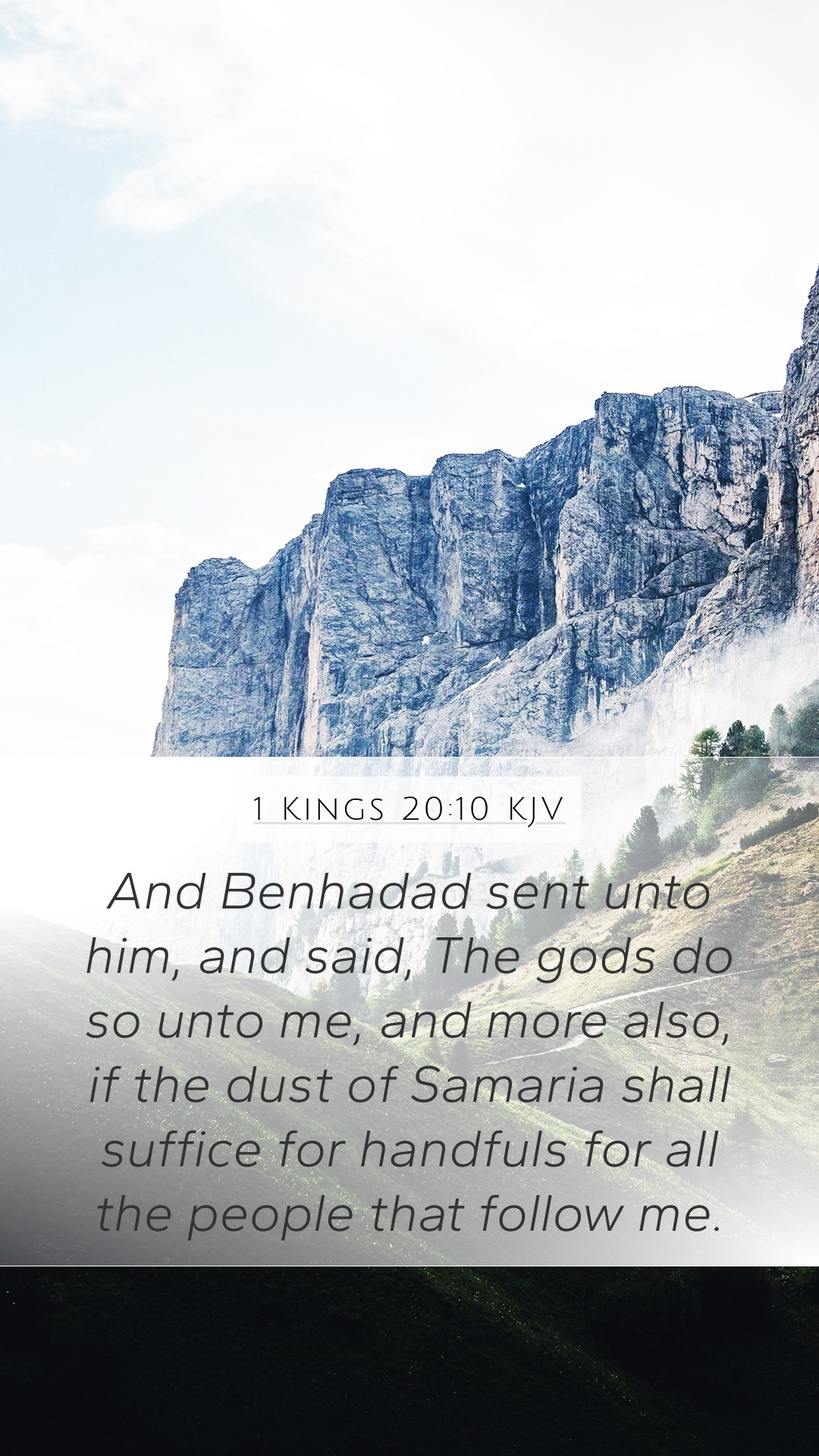Bible Verse Meaning of 1 Kings 20:10
Verse Text: "And Ben-hadad sent unto him, and said, The gods do so unto me, and more also, if the dust of Samaria shall suffice for handfuls for all the people that follow me."
Understanding 1 Kings 20:10
This verse depicts a bold threat from Ben-hadad, king of Aram, to Ahab, king of Israel. In attempting to intimidate Ahab, Ben-hadad invokes the gods, suggesting a desire for divine retribution if he cannot conquer Samaria. The verse illustrates themes of arrogance, aggression, and the psychological warfare that often precedes military conflict.
Insights from Public Domain Commentaries
-
Matthew Henry:
Henry emphasizes the pride of Ben-hadad, showcasing his boastfulness and belief in his military superiority. He interprets this as a reflection of worldly might, contrasting it with the divine authority that God holds. Henry posits that Ben-hadad's claim is not only a challenge to Ahab but also an affront to God Himself.
-
Albert Barnes:
Barnes points out that Ben-hadad's proclamation is meant to instill fear in Ahab and his people. By referencing the dust of Samaria, he implies that he could easily conquer the city, so much so that its dust would be measured out like food for his troops. This highlights the siege mentality of the time and serves as a reminder of the power dynamics at play.
-
Adam Clarke:
Clarke notes the psychological aspect of warfare depicted in this verse. He explains that Ben-hadad’s message was as much about intimidation and bravado as it was about actual military strategy. The claim of taking the dust as a measure illustrates his intent to demean Ahab's forces, which Clarke argues is a common tactic in ancient warfare.
Historical Context
The context of this verse is essential to grasping its meaning. During the reign of Ahab, Israel faced significant challenges from neighboring kingdoms, with Ben-hadad being a prominent adversary. Understanding the geopolitical tensions of the era can deepen one's understanding of Scripture and the implications of such a bold declaration.
Theological Implications
This verse raises several questions of faith, power, and divine sovereignty. Ben-hadad's confidence in typical warfare contrasts sharply with the biblical understanding of God's control over all nations. This situation can serve as a reminder of the ultimate authority God holds over earthly rulers, a theme prevalent throughout both the Old and New Testaments.
Application to Daily Life
When reflecting on 1 Kings 20:10, we can also consider how we respond to challenges and threats in our own lives. The verse serves as a powerful reminder that pride and arrogance, much like that of Ben-hadad, can lead to downfall. As believers, recognizing the limitations of human strength compared to divine power can help cultivate humility and reliance on God.
Related Bible Cross References
- 1 Kings 20:1: Introduction to the conflict between Ben-hadad and Ahab.
- 2 Chronicles 18:1-3: Ahab's alliance with Jehoshaphat and the tragic consequences.
- Isaiah 36:18-20: Comparison of the threats made by foreign powers against God's people.
Conclusion
In summary, 1 Kings 20:10 provides critical insight into the mindset of ancient rulers as well as the struggles faced by Israel. Through the interpretative insights of esteemed commentaries and an understanding of the historical and theological implications, readers can uncover profound Bible study insights applicable to their own faith journeys.


